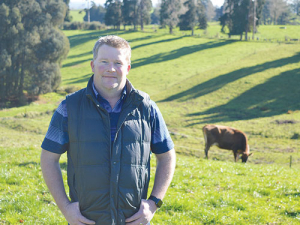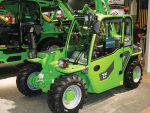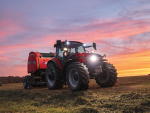Wayne Shaw is in the final stages of registering Rangedfree as a trademark for dairy and meat products from animals raised and grazed outdoors.
Shaw, who farms at Ohaupo, says Rangedfree will capture the true value of exports, adding at least 5% to the sectors’ current export earnings. According to Statistics New Zealand, in 2017 dairy exports were valued at $14 billion and meat exports at $6.6b.
Shaw told Dairy News that while working on dairy farms in the US and Canada he saw no cows grazing grass.
“It’s quite a contrast to what we are used to; I found this unique. The way we farm in New Zealand, where our animals are allowed to roam freely outside and graze on pasture, is not common farming practice in many countries overseas, even though it’s so normal to us.”
Shaw says he learned from US and Canadian farmers that NZ farms and their farmers are highly regarded overseas.
“Overseas we’re seen as the pinnacle -- the top-end of meat and dairy producers,” he says. “The way we farm is so normal to us that we haven’t set our export price for meat and dairy accurately: we’re underselling ourselves.”
Shaw says the Rangedfree certification will provide an opportunity for NZ’s meat and dairy sectors to showcase the premium nature of their products with a widespread, industry-recognised brand. Exporters will be able to use a certification stamp or sticker on products to instantly tell international consumers that the product is sourced from outdoor-farmed animals.
“We produce premium meat and dairy products that are, by and large, from animals raised on outdoor farms, and consumers value this and are willing to pay more for these products.
“Through discussions and calculations with a research company and industry experts we’ve conservatively estimated that Rangedfree has the potential to add at least 5% -- more than $500 million -- additional profit to New Zealand’s meat and dairy exports a year.
“The Rangedfree certification fills the gap that currently exists in terms of having a widespread, recognised brand that showcases the premium quality of our meat and dairy products to our export markets.”
Shaw says most meat and dairy farms in NZ will meet Rangedfree criteria. Farms will have to show their animals are largely grazed outdoors and are not housed indoors for more than 110 24-hour periods (days) in a year. That is, they must be allowed to range freely outside for at least 255 days a year on a rotational grazing system.
Rangedfree certification will be approved for farms based on the records they currently supply to their manufacturers and suppliers which outline their farm’s housing structures and how long their animals spend indoors.
Shaw says the 110 days cap accounts for the colder winter and spring months where some animals are housed indoors for environmental reasons.
“As a farmer, I know most farms in New Zealand wouldn’t exceed 110 24-hour periods spent inside. This compares favourably to some of the standards I have seen overseas.”
He expects the Rangedfree trademark to be finalised within a year.
















